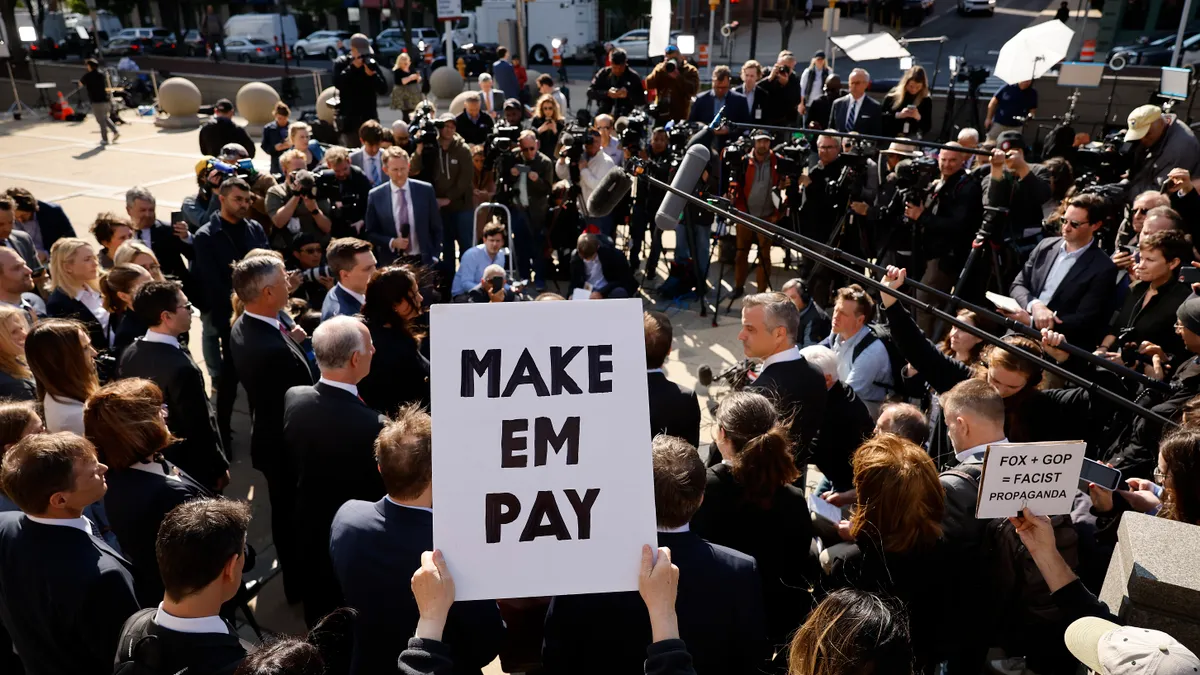The decision by Fox Corporation to wait until the last minute to settle the landmark defamation case against it by Dominion Voting Systems after months of damaging public discovery stems from a misplaced view by its top legal officer that it would eventually win the case on First Amendment grounds, reporting indicates.
“Fox’s chief legal officer, Viet Dinh, reassured the board: Even if the company lost at trial, it would ultimately prevail,” The New York Times said in a May 27 report.
Dinh also told the board that Fox stood to lose more money in legal fees than it would pay to Dominion, which was seeking $1.6 billion for advancing claims its machines had switched votes from President Trump to Joe Biden in the 2020 presidential election.
“That determination informed a series of missteps and miscalculations over the next 20 months,” The Times reported. These missteps included the company’s decision not to settle early enough to avoid the release of damaging private emails and texts from executives and hosts.
“Repeatedly, Fox executives overlooked warning signs about the damage they and their network would sustain,” The Times said.
First Amendment protection
Dinh, who served as an assistant attorney general under George W. Bush before joining Fox, said claims about voting machine fraud were newsworthy.
“Fox News did its job,” Dinh said in a 2021 interview. “This is what the First Amendment protects.… I’m not at all concerned about [defamation] lawsuits, real or imagined.”
Former Trump Attorney General Bill Barr, who served with Dinh at the Department of Justice, said the legal strategy Fox pursued was the right one.
“I think Viet and Fox carried out just the right strategy by moving down two paths simultaneously,” he told The Times, “first, mounting a strong legal defense, one that I think would have eventually won at the appellate stage, and, second, continuously assessing settlement opportunities at every stage.”
Neutral reporting claim
But critics say Fox missed its best chance to settle after the judge overseeing their case, Eric Davis of the Delaware Superior Court, denied the company’s motion to dismiss the suit in 2021 and took off the table what’s called the neutral reportage privilege doctrine.
The doctrine holds that a news organization can’t be held liable for damages if a public figure makes a false assertion as long as the news outlet doesn’t embrace or endorse the assertion and tries to report on it accurately and objectively.
Not only was the doctrine falling out of favor in the courts, the report said, but Fox would have had a hard time showing it was trying to report on the assertions accurately. Among other things, Dominion had sent Fox thousands of communications explaining why the reports it was airing were wrong and asking for them to be walked back, but the network never responded to Dominion’s outreach.
“That was a natural time to settle,” The Times reported. The ruling meant Fox lost the most important part of its defense strategy and it gave Dominion access to Fox’s internal communications in discovery.
“Fox stuck with its defense,” the report said.
The result was months of damaging public disclosures of internal Fox communications.
It was only when Fox executives learned at the last minute of especially damaging communications involving its top-ranked host, Tucker Carlson, that it switched gears; rather than accept a loss at trial and hope to win on appeal, it would settle.
“The board … was concerned that Dominion was prepared to use the [Carlson] message to further undermine the company with the jury,” the report said.
Lachlan Murdoch, the company's CEO, obtained board approval to accept a settlement. Then, on the first day of trial, it settled for $787.5 million, a record for defamation.
“There was broad agreement among people with knowledge of the discussions that the Carlson text, and the board’s initiation of an investigation [to uncover other damaging communications], added to the pressure to avoid trial,” the report said.
Dinh didn’t respond to requests for comment from The Times and Fox released a statement saying it wouldn’t comment on its strategy.
“Discussions of specific legal strategy are privileged and confidential,” the company said in a statement.
Separately, First Amendment specialists have questioned Dinh’s view that Fox ultimately would have prevailed at the Supreme Court, had it come to that.
“If Dominion [had] won the case, there is no way on earth the Supreme Court would have touched this case,” Lee Levine, a media attorney with Ballard Spahr, said in a forum on the case hosted by the Foundation for Individual Rights and Expression. “The fact that the general counsel of Fox Corporation Viet Dinh supposedly told his client that he was certain that the Supreme Court would take the case if Dominion won and rule in their favor is truly from another universe.”



















